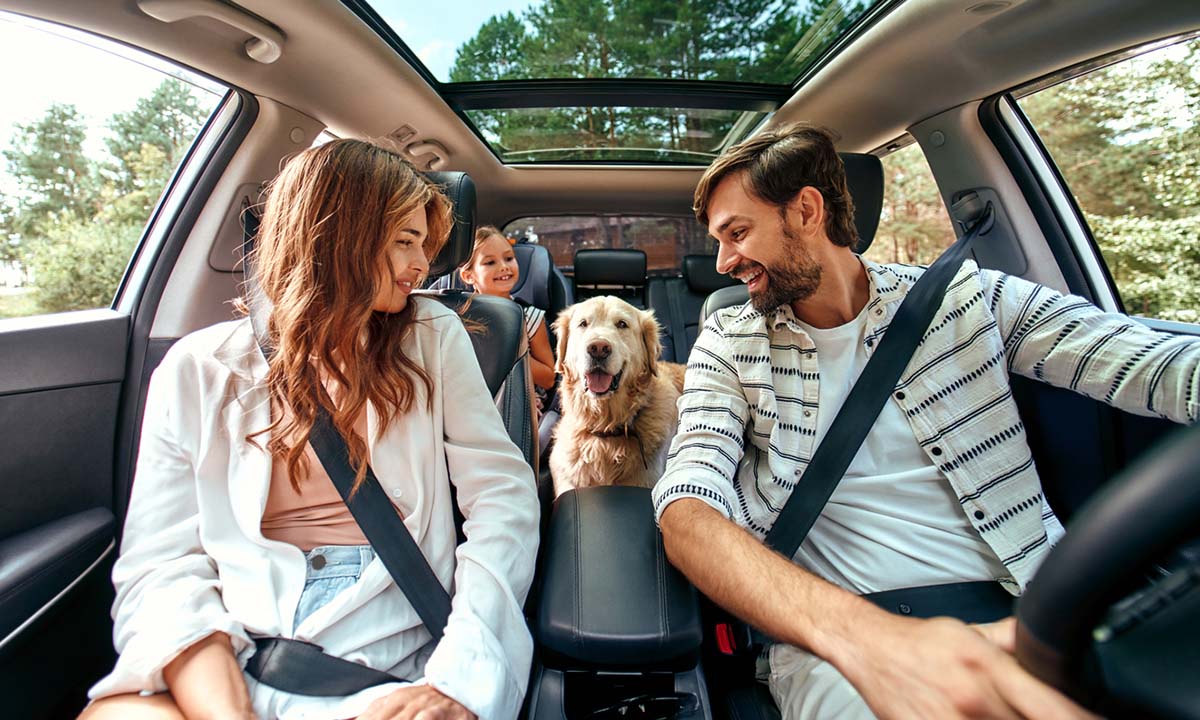Best Food for Overweight Dogs: What Works
In addition to standard tactics like cutting calories and portion control, the right dog food plays a big part in successful weight loss.
Some pet parents try everything before switching their pup to appropriate food for overweight dogs. If you’ve tried everything — portioning out the kibble, limiting snacks and dog treats, never (OK, rarely) offering your dog table scraps — but your pooch is still packing on the pounds, know that you’re not alone in your struggle.
According to the most recent data from the Association for Pet Obesity Prevention, more than 59 percent of dogs are overweight.
As daunting as those figures might seem, there’s hope. In addition to standard tactics like cutting calories and portion control, choosing the right dog food for your overweight dog plays a big part in successful weight loss and long-term health.
Health Problems of Overweight Dogs
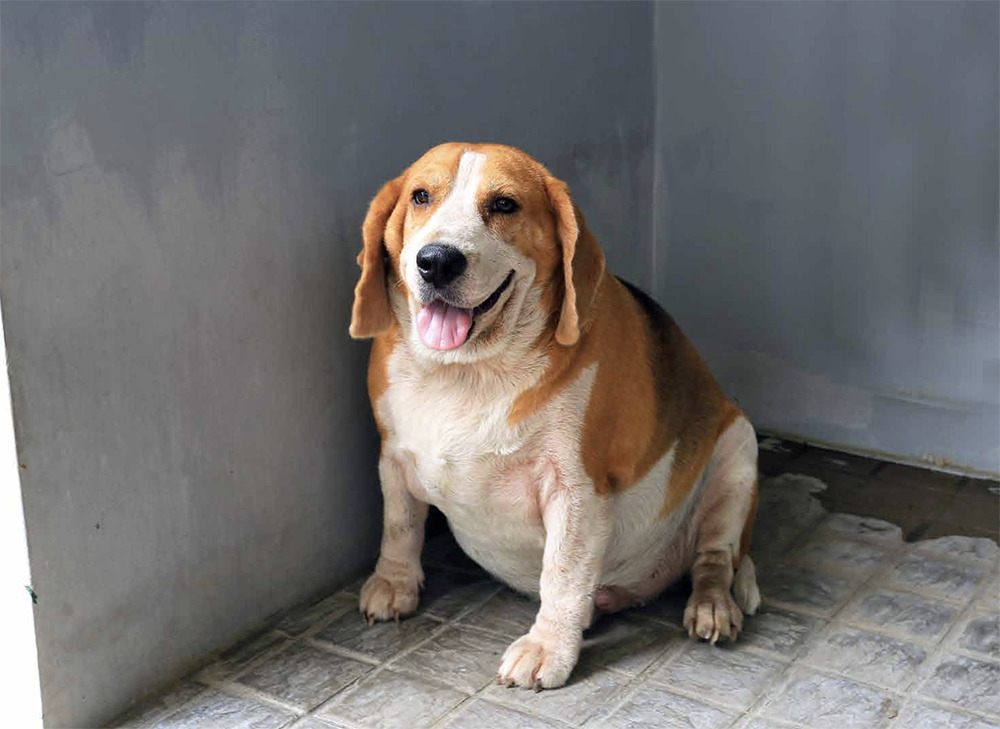
Although it’s tempting to view your adorably pudgy pup’s extra pounds as simply “more to love,” the sobering truth is that excess weight can have a serious impact on your dog’s health. And there’s nothing adorable about that.
The next time you need a little motivation to help your pet shed some pounds, consider these facts:
- Overweight dogs are diagnosed with diabetes 3x more often than dogs that maintain an ideal weight.
- Obesity in dogs can change the structure of their hearts, impair cardiac function, and contribute to heart disease.
- Excess weight stresses your dog’s joints, increasing wear and tear and contributing to the development and progression of osteoarthritis
- Your dog’s extra pounds contribute to a shorter lifespan by up to 2.5 years.
Since your pet can’t sign up for cardio classes or shop for healthier meal options, it’s up to you to manage their weight loss journey and future health.
“You can help your dog live longer by keeping them at an ideal body weight or body condition,” explains Jessica Wilson, DVM. “They can be more active as well, and that will all contribute to longevity.”
I’m not overfeeding, so what’s the issue?
Some breeds are more prone to obesity than others. Breeds predisposed to obesity include:
- large breed dogs like Labrador retrievers
- Beagles
- Dachshunds
- Cavalier King Charles spaniels
- small breeds like Pugs
- Cocker spaniels
In addition to breed, metabolism can also play a role. Senior dogs have slower metabolisms, and diseases like hypothyroidism can make it harder for dogs to lose weight.
Another reason your dog may be struggling to lose weight is a lack of l-carnitine, an amino acid that helps convert fat into energy. Proteins that have carnitine include red meat like lamb, and poultry like turkey and real chicken.
Your veterinarian can help rule out any underlying reasons the needle on the scale may not be moving in the right direction.
Hot to Tell If Your Dog Is Overweight
Addressing weight gain before it becomes a bigger health issue is important. But it’s not always easy to tell when a dog is overweight.
You might notice that your pet’s collar or harness requires adjusting to fit their expanding frame. Or your veterinarian may point out weight gain during an annual exam. But by that time, you might have a lot of damage to undo.
To prevent obesity from becoming a serious health threat for your dog, it’s best to take a proactive approach. That’s why Dr. Wilson suggests using the same technique veterinarians use to gauge your pet’s weight: body composition score.
Because dogs come in all shapes and sizes, with a lot of variances due to breed, sex, and age, there’s no universal weight chart that applies to all dogs. That’s why determining whether a dog weighs too much is less about the number on the scale and more about their body condition score.
Veterinarians rely on a visual assessment and physical exam to assign a body composition score. The score is based on how much fat your dog is carrying on their frame: An overweight dog will have a sagging stomach, thick waist, broad back, and a layer of extra padding covering their ribs. While dogs with an ideal body composition have visible waistlines, an abdominal tuck where their stomach arches toward their hips, and no noticeable fat covering their ribs.
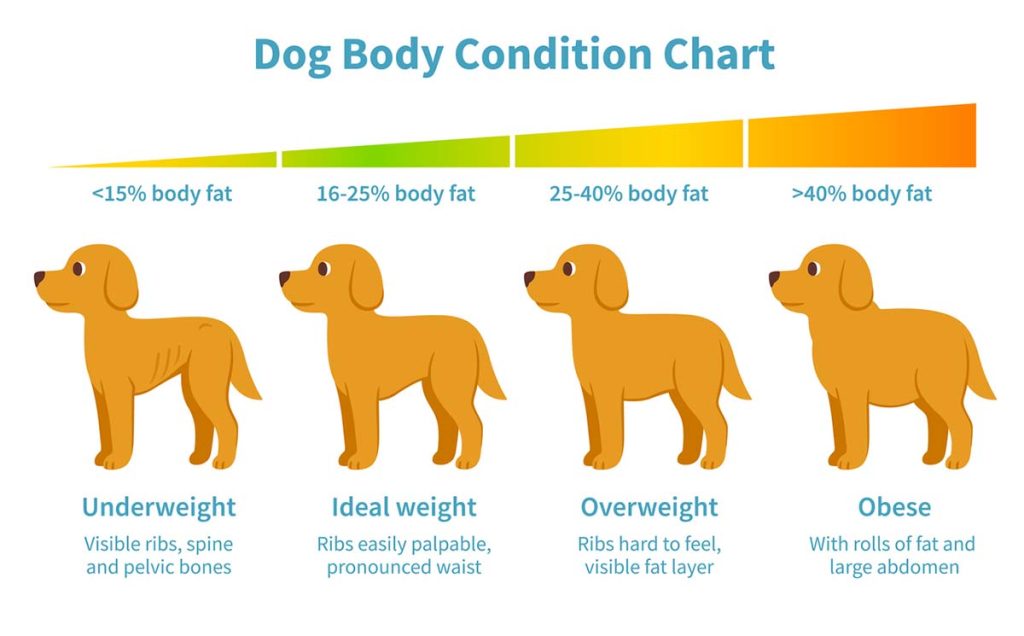
Weight-Loss Strategies for Obese Pets
Depending on how much excess weight your dog is carrying, your veterinarian may recommend a variety of weight-loss strategies — everything from increased exercise to cutting back on kibble and treats, to adopting a special diet designed to help your dog drop the pounds.
In addition, your veterinarian or veterinary nutritionist may try to rule out any underlying health issues that could be contributing to weight gain, says Dr. Wilson.
“If your dog’s weight is not moving even after you’ve dropped the calories and eliminated all the treats, then there may be something medically going on,” adds Dr. Wilson. If that’s the case, it’s essential to diagnose and treat the underlying issue properly before any weight loss efforts can succeed.
The Best Dog Food for Overweight Dogs
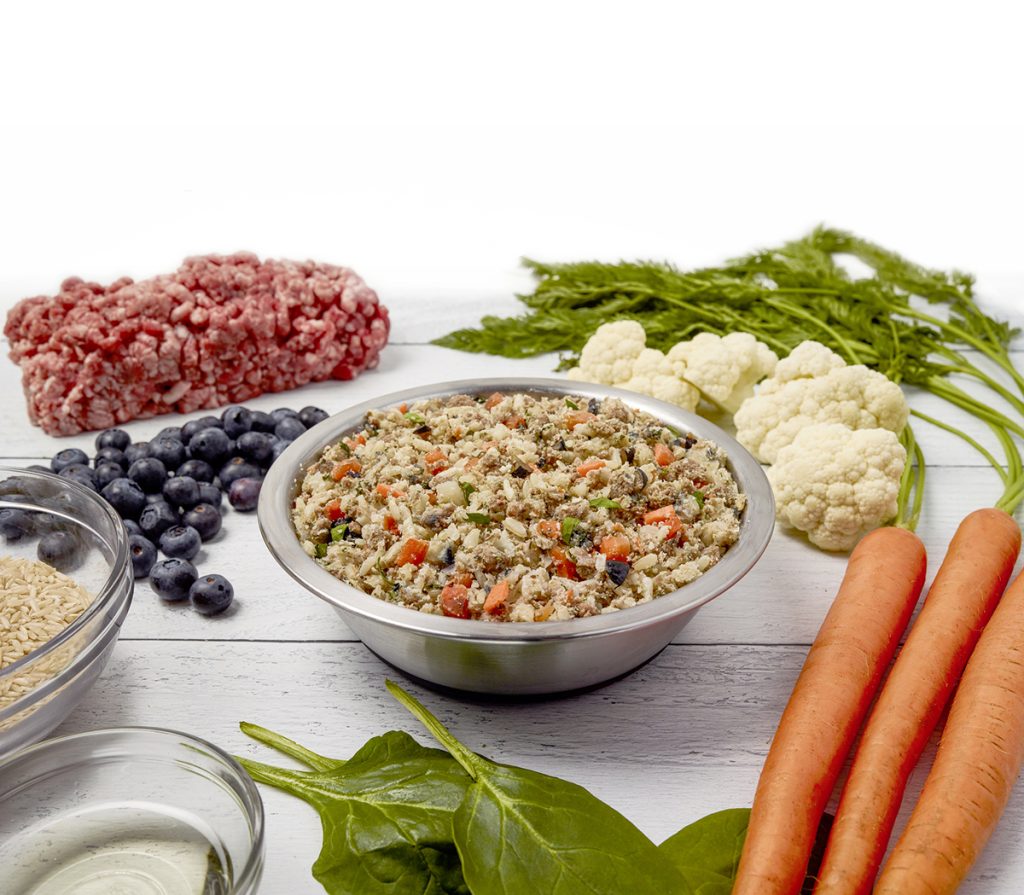
Weight management starts with nutrition. When it comes to finding the right food for your overweight dog, it’s important to know that not all dog foods are created equal.
Most processed dry dog food (and commercial wet dog food) contain fillers, preservatives, by-product meal, and artificial flavors. They also tend to be more calorie-dense, meaning a standard serving is packed with a lot of calories. Because many weight loss plans recommend cutting calories, a kibble-fed dog would receive a much smaller serving, which could leave them super hungry and begging for more pet food.
“When you have to restrict the volume or measured quantity of that kibble, your dog is just hungry all the time,” Dr. Wilson explains.
Prescription weight management dog food diets are another mealtime go-to for overweight dogs. According to Dr. Wilson, “Commercially available prescription weight-loss diets are more restricted in calories but tend to be a bit higher in fiber, which helps dogs feel fuller while we’re restricting their calories.”
Fresh Dog Food for Overweight Dogs
To help your dog lose weight, Dr. Wilson recommends weight-loss dog food made from high-quality, fresh whole-food ingredients as the gold standard for weight loss and overall wellness in dogs.
“With fresh whole food, the big advantage is that your dog’s going to absorb more of the nutrients and can actually eat a larger volume of food and feel full. They’ll also benefit from increased energy from the nutrients,” Dr. Wilson says. “You’re going to have an easier time with helping them lose the extra weight.”
Plus, fresh dog food recipes are complete and balanced to meet their nutritional needs as defined by AAFCO, despite any dietary restrictions.
Choosing the Right Fresh Dog Food Recipe for Weight Loss
JustFoodForDogs’ Fish & Sweet Potato meal is one low-fat dog food recipe with healthy carbohydrates and antioxidants that Dr. Wilson recommends. It is a great weight control choice for adult dogs who need to shed a few pounds, but still like to eat…a lot. It is also a grain-free dog food that’s good for dogs who may be allergic to gluten.
“It’s made with fresh whole foods, including codfish that is low in fat and rich in healthy fatty acids. And it contains a lot of fiber from vegetables, which promotes satiety,” says Dr. Wilson. “It’s a leaner recipe so your dog can actually consume more volume of food. That’s going to give you an easier time getting that weight loss.”
That’s not to say all JustFoodForDogs recipes are appropriate for weight loss. While healthy and nutritious, some recipes may be off-limits for dogs working on whittling their waistlines.
Dr. Wilson notes that the Beef & Russet Potato diet is popular, but it’s also calorie-dense with a higher fat content…part of the reason it’s so darn tasty! The recipe is packed with high protein beef and liver, plus lots of fiber from sweet and russet potatoes. This makes it a great choice for dogs maintaining a healthy weight, but not for those working toward a weight loss goal.
The best dog food for overweight dogs contains low calories (kcal) as well as the right ingredients and nutrients to support weight loss. Your veterinarian may also recommend a diet with certain nutrients for the immune system, fat content, or calorie density based on your dog’s life stage, existing health conditions, or other factors, including breed.
Why is palatability important in weight-loss dog foods and what are some suggestions for maintaining a dog’s interest in eating during a diet?
Maintaining palatability in weight-loss dog foods is crucial because if a dog does not find the food appealing, it may eat less than needed, which can lead to nutrient deficiencies and decreased energy levels. Many weight-loss formulas are less palatable to dogs, often due to increased fiber content and reduced fat levels.
To keep a dog interested in its diet food, consider opting for canned or fresh varieties, which generally offer a stronger aroma and flavor that dogs find more appealing. These types can stimulate a dog’s appetite more effectively than dry kibble, helping to ensure that your pet continues to eat regularly while on a diet.
How can fiber and water content in dog food help manage a dog’s weight without compromising essential nutrients?
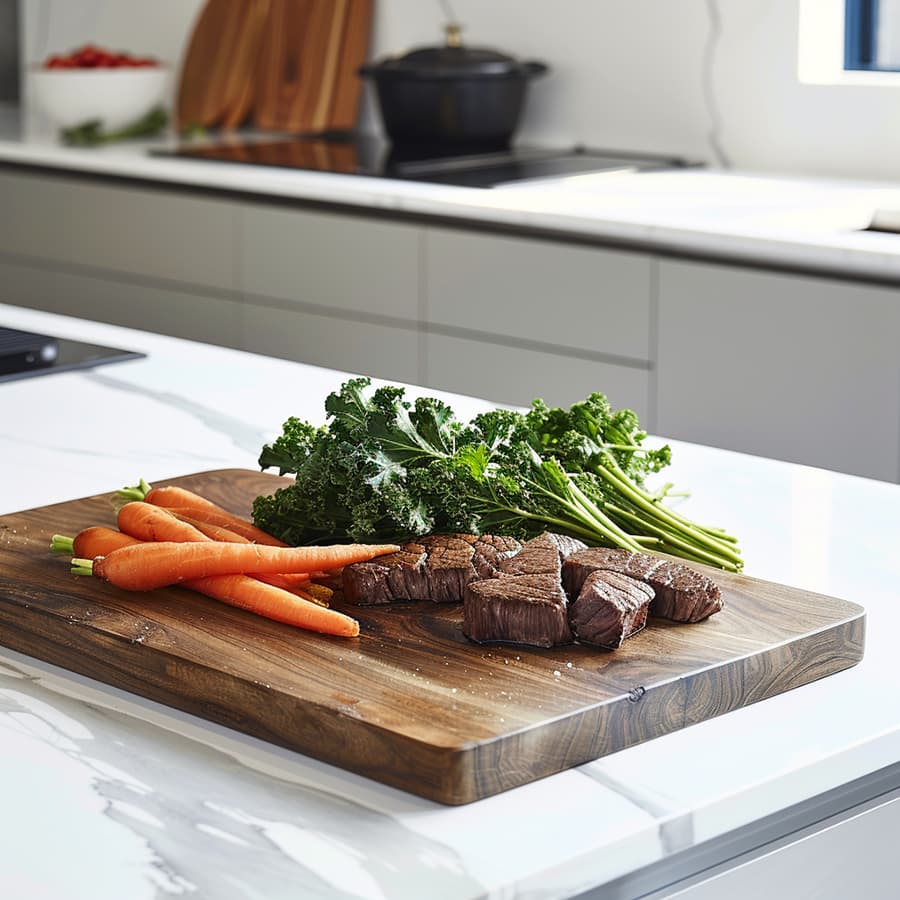
Incorporating fiber and water into a dog’s diet plays a critical role in managing weight without sacrificing essential nutrients. Fiber, particularly from vegetables such as broccoli, cauliflower, celery, and green beans, is vital. These vegetables not only provide a low-calorie source of fiber but also ensure that dogs feel fuller for longer, thereby reducing overall calorie intake. To integrate more fiber into your dog’s meals, consider enhancing their regular food with these high-fiber vegetables.
Enhancing a dog’s diet with increased water content is another effective strategy for weight management. Opting for canned or fresh dog foods, which typically contain more than 70 percent water compared to less than 10 percent in dry kibble, can help increase a dog’s water intake. This higher water content in food helps increase the volume of food without adding calories, leading to better satiety — thus helping the dog eat less while still feeling full.
Alternatively, soaking dry kibble in water before feeding can also increase the water content, which aids in weight management while ensuring that the dog still receives all necessary nutrients.
Weight Loss in Dogs: What to Expect
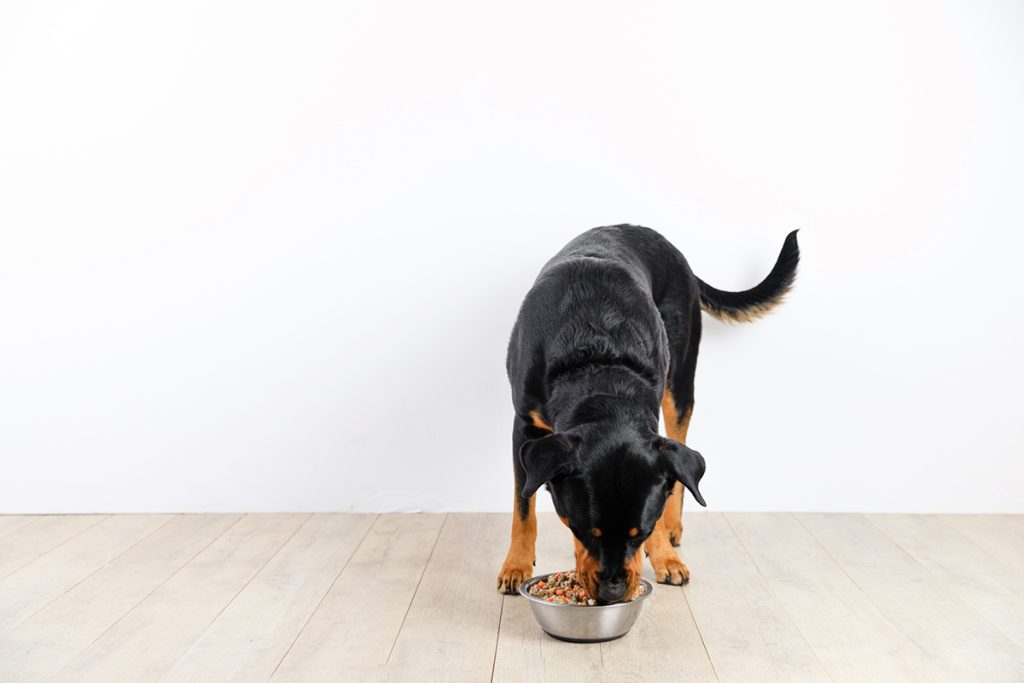
As in any weight loss journey, it’s important to take things slow. A successful plan for your dog’s weight loss includes a paced transition to a new diet based on your dog’s needs.
Dr. Wilson advises eliminating all extra treats and slowly introducing fresh whole foods; it’ll take up to two weeks to fully transition to a JustFoodForDogs whole foods diet.
You’ll start by replacing 25 percent of your current kibble with the JustFoodForDogs recipe for three days and, over the next two weeks, increase the amount of JustFoodForDogs recipe to 50 percent and 75 percent of your dog’s daily meals until you have fully replaced their kibble with fresh whole foods.
“We have Nutrition Consultants that are available to teach you how to make the transition,” Dr. Wilson says. “We do recommend a slow transition so we don’t cause any gastrointestinal upset.”
Once your dog is eating a fresh whole food diet, continue monitoring their weight loss progress. Research suggests establishing a weight loss goal of 0.5 percent to two percent of body weight per week, which ranges from a few ounces to 1.5 pounds for a 75-pound dog (and even less for smaller breeds like dachshunds and pugs).
“Give them a couple of weeks of being just on this diet, and then reassess their weight,” recommends Dr. Wilson. The slow pace can be frustrating for pet parents but is the best approach for long-term success.
Since the number of calories (and the overall amount of food) you’re offering is based on your dog’s perfect weight, once they achieve their weight loss goals, their diet, including portion size, can remain the same.
After reaching your weight-loss goal
“Once your dog reaches that goal weight, there’s no need to transition them to a different food,” Dr. Wilson says. “We can just keep them on the same diet at a maintenance calorie range. If you notice that your dog continues to lose weight, the easy solution is to just bump up the calories a little bit but, in general, once you hit the target weight range, you keep on with the same feeding routine.”
You’ll also want to introduce an exercise routine or increase the amount of time your dog spends on walks, at the dog park, playing fetch, or navigating an agility course.
Getting your pup moving is important but, Dr. Wilson explains, diet is still the key to successful weight loss; prioritizing a fresh, whole-foods diet with the right balance of nutrients, fat, lean protein, and calories, and incorporating exercise into your daily routine can help transform your chubby canine into a playful pooch with fewer health issues, longer lifespan and improved quality of life.
You can find grain-free diets and grain-inclusive diets by JustFoodForDogs on our website, Chewy, Amazon, and Petco.
This content is for informational use only and does not replace professional nutrition and/or medical advice, diagnosis, or treatment. It is not a substitute for and should not be relied upon for specific nutrition and/or medical recommendations. Please talk with your veterinarian about any questions or concerns.
Byers, Christopher G., Cindy C. Wilson, Mark B. Stephens, Jeffrey L. Goodie, F. Ellen Netting, and Cara H. Olsen. 2014. “Owners and Pets Exercising Together: Canine Response to Veterinarian-Prescribed Physical Activity.” Anthrozoös 27 (3): 325–33. https://doi.org/10.2752/175303714×14036956449224.
Anderson, Katharine L., Helen Zulch, Dan G. O’Neill, Richard L. Meeson, and Lisa M. Collins. 2020. “Risk Factors for Canine Osteoarthritis and Its Predisposing Arthropathies: A Systematic Review.” Frontiers in Veterinary Science 7 (220). https://doi.org/10.3389/fvets.2020.00220.
Tropf, M., O.L. Nelson, P.M. Lee, and H.Y. Weng. 2017. “Cardiac and Metabolic Variables in Obese Dogs.” Journal of Veterinary Internal Medicine 31 (4): 1000–1007. https://doi.org/10.1111/jvim.14775.
Heeley, Angela M., Dan G. O’Neill, Lucy J. Davison, David B. Church, Ellie K. Corless, and Dave C. Brodbelt. 2020. “Diabetes Mellitus in Dogs Attending UK Primary-Care Practices: Frequency, Risk Factors and Survival.” Canine Medicine and Genetics 7 (1). https://doi.org/10.1186/s40575-020-00087-7.




